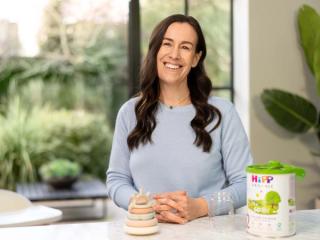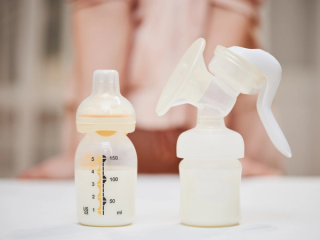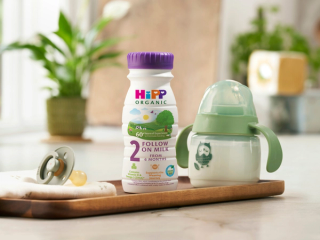
- Home
- Advice Hub
- Baby
- Baby Feeding
- How To Increase Your Breastmilk Supply
How to increase your breastmilk supply
Worried that your breastmilk supply is decreasing? Learn expert tips and get advice on how to increase your breastmilk supply.
A common concern people have about breastfeeding is that they won’t produce enough milk to satisfy their baby. Breastfeeding is a new skill which both you and your baby need to learn and it can be challenging, particularly at the start. It is normal for your newborn to lose some weight in the first few days, and it can take around two weeks for them to regain their birth weight. This doesn’t mean that you aren’t producing enough milk. However, if your baby has lost a large amount of weight or takes longer than two weeks to get back up to their birth weight, contact your midwife or health visitor for advice.
With the right guidance and support, most women are able to produce enough breast milk for their little one to thrive, but there are things you can do to help build up your milk supply.
What are the signs your milk supply is decreasing?
If your milk supply is decreasing, there are some signs you might notice in yourself or your baby.
For your baby, one key sign is fewer wet nappies throughout the day or noticing urine which is dark or concentrated. After the first week, a well-fed baby typically has 6–8 wet nappies daily with urine that is pale yellow in color. Similarly, fewer dirty nappies might be a sign of your baby not getting enough milk, as consistent bowel movements are often a sign of feeding adequately. If your baby isn’t gaining weight as expected, it could be an indicator of not getting enough milk. Finally, if your baby is unsettled and feeding for unusually long periods, it might mean that they’re not getting as much milk as they need.
Within your own body, signs of reduced milk supply include consistently softer breasts and a lack of fullness. Some softening of the breasts is normal as your body adjusts to breastfeeding. However, persistently soft breasts may suggest lower milk production.
Some discomfort when breastfeeding can occur in the early days, but should improve as you and your baby learn together. However, ongoing nipple pain or discomfort during latching could indicate an improper latch. A poor latch can interfere with milk transfer and reduce your supply. Lastly, if you pump your milk, you might also notice a drop in the amount you’re able to express, which could indicate reduced supply.
What are the causes of low breast milk supply?
Understanding reasons why your milk supply has reduced can help guide you to make steps to increase your milk supply.
Supplementing breastfeeding with formula can sometimes lead to a decrease in milk production. If formula milk is offered instead of breastfeeding, your body may reduce how much milk it makes. Similarly, if your baby isn’t latching correctly, your body may not be stimulated to produce enough milk.
Managing stress and tiredness can be difficult with a newborn, but it can disrupt the hormonal balance needed for breastfeeding. These changes can make it more difficult to maintain milk supply.
For some women, health conditions, such as polycystic ovary syndrome (PCOS), gestational diabetes, insulin dependent diabetes, excessive blood loss, thyroid conditions, caesarean birth or previous breast surgeries may impact your body’s ability to produce milk.
Finally, skipping meals or not drinking enough water can leave your body unable to maintain milk supply levels. Stay well hydrated and eating often will help ensure your body has enough energy to produce breast milk.
How to increase breast milk production?
Low milk supply can be a source of worry for many mums. If you are wondering how to increase milk supply, the following strategies can help boost breast milk production.
Feed on demand
Breastfeeding works on a supply and demand basis, so the more your baby feeds, the more milk your body will produce. Feeding on demand is really important, even if it can feel like all the time.
Feeding on demand is more successful for building up milk supply than feeding on a schedule. If you try to get your baby into a strict routine in the first few days or weeks, your newborn may not get all the milk they need and your supply could drop.
Generally, a newborn baby feeds between eight and 12 times a day. In the first few days after birth, it may even be necessary to wake your baby and actively encourage them to feed in order to ensure they are getting enough, as they can be particularly sleepy to begin with.
When your baby is nursing, let them feed until they pull off the breast themselves or fall asleep.
Don’t time your feeds or remove your baby before they have finished nursing as this could prevent them from getting all the milk they need, and they may be unsettled or hungry. When you're feeding, offer both breasts and remember to switch breasts at each feed.
Topping up your baby’s feeds with formula can also impact your milk supply, as your body will think it doesn’t need to produce as much to satisfy your baby’s appetite.
If you are not able to breastfeed for a period of time, it is a good idea to express your milk at the times your baby would usually feed to help maintain your milk supply. Using warm compresses on your breasts before expressing can aid milk removal, and double pumping (pumping each breast at the same time) can increase the amount of milk produced, in less time.
Avoid using a dummy
For the first few weeks, your breastfeeding routine and milk supply is becoming established, and your newborn is learning a new skill of breastfeeding. Using a dummy (or pacifier) can reduce how often your baby wants to feed and cause disruptions with their latch. If you do want to use a dummy to calm your baby, wait until you are confident that they are breastfeeding well and your milk supply is steady. This can take around six weeks.
Skin to Skin contact
Other tips for lactation include lots of skin to skin contact with your baby. Skin to skin is important because close contact stimulates the release of the hormones prolactin and oxytocin, which play an important role in milk production. Enjoy giving your little one lots of cuddles and keep them close. When you can, spend some time with your top off and lay your baby on your chest in just their nappy. Finally, don’t overlook the importance of rest and hydration, as breastfeeding is demanding on your body. Prioritise sleep, rest when you can, and drink plenty of water throughout the day.
Foods to stimulate breast milk
Make sure you are eating well and staying hydrated. It takes a lot of calories to produce breast milk so if you are skipping meals or not drinking enough, this can interfere with your milk supply.
You don’t need to eat anything special when you’re breastfeeding, but it is a good idea to make sure you’re eating a variety of healthy foods, and getting all the nutrients you need to keep your energy up (See HiPP’s ‘what should I eat when breastfeeding’ guide).
You may see information about foods or recipes that claim to increase your milk supply, however, these claims are largely unproven.
Getting support
Hopefully, you will now have some clear direction for how to boost milk production, but one of the best ways to boost your milk supply is to seek support from a breastfeeding expert. They can answer any questions you have, check your feeding technique and offer advice. Contacting your midwife, public health nurse or health visitor is a good place to start, but you may want to go along to a breastfeeding support group in your area or see a lactation consultant. As well as offering practical advice, they will be able to explore whether you are producing enough milk or whether there might be other factors, such as your baby’s latch.
If you're worried that your baby is not getting enough milk, talk to your midwife, public health nurse, health visitor or a breastfeeding specialist as soon as possible.
FAQs on increasing breastmilk supply
Yes, pumping every two hours can help stimulate your body to produce more milk. Frequent milk removal, either through pumping or hand expressing, signals your body to make more milk. This can be particularly helpful if your baby is not feeding effectively or if you’re trying to build your supply.
Drinking more water than your body needs has not been shown to directly increase milk supply. However, breastfeeding often makes you feel thirstier, so it’s important to drink enough water to stay hydrated and meet your body’s needs.
It’s never too late to work on increasing your milk supply, but it can become more challenging after the first six weeks, when your milk production stabilizes. With consistent effort, such as frequent milk removal and guidance from a healthcare professional, you can still see improvements. Consider consulting a lactation consultant, midwife, public health nurse or health visitor for tailored advice.
Milk production typically peaks around 4–6 weeks postpartum, and the largest increase happens in the first two weeks after birth. During this time, frequent and effective milk removal—whether through feeding, pumping, or hand expressing—is crucial to establish and maintain a good supply. If milk isn’t removed often enough, your body may start producing less.












